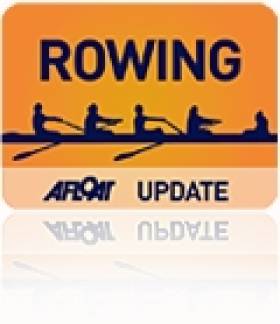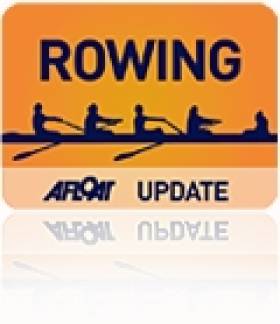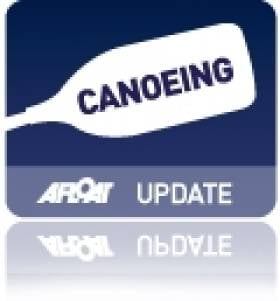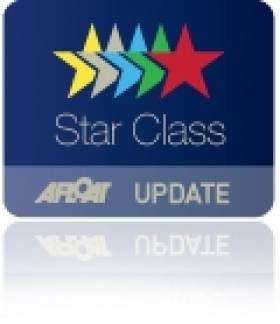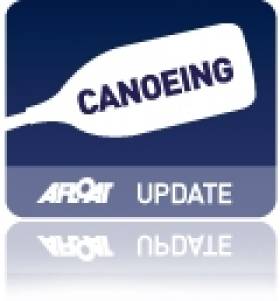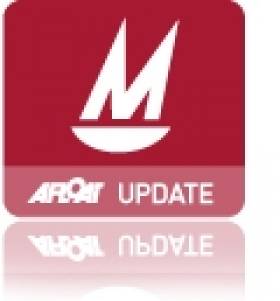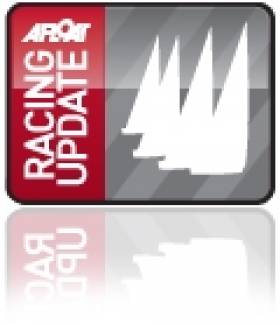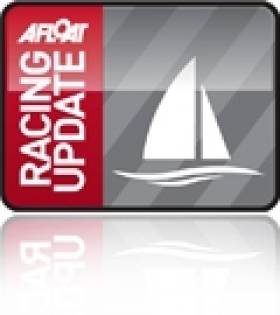Displaying items by tag: European Championships
Keohane Fights Good Fight At European Championships
# ROWING: John Keohane fought to the very end of his race but just missed out on a place in the A/B Semi-Finals of the men’s single sculls at the European Championships in Seville today. The Corkman, making his debut at this level, finished fourth of six in this evening’s repechage.
The Ireland lightweight double had to take a top-two place in their repechage but finished third behind Poland and Turkey.
European Rowing Championships, Seville – Day One (Irish interest)
Men
Lightweight Double Sculls – Heat Four (One Directly to A/B Semi-Finals; rest to Repechages): 1 Italy (A Micheletti, P Ruta) 6:39.92; 2 Austria 6:44.49, 3 Ireland (N Kenny, J Ryan) 6:47.43, 4 Bulgaria 6:48.89, 5 Czech Republic 6:51.76. Repechage Three: 1 Poland 6:22.93, 2 Turkey 6:25.31, 3 Ireland 6:32.54, 4 Portugal 6:38.49.
Single Sculls – Heat One (First Two Directly to A/B Semi-Finals; rest to Repechages): 1 Germany (M Hacker) 7:03.91, 2 Lithuania (M Griskonis) 7:08.15; 3 Italy 7:19.44, 4 Greece 7:22.19, 5 Ireland (J Keohane) 7:25.67, 6 Russia 7:27.89. Repechage Two: 1 Bulgaria 6:56.69, 2 Greece 6:57.73, 3 Ukraine 6:57.99, 4 Ireland 6:58.94, 5 Switzerland 7:05.56, 6 Belarus 7:08.61.
Women
Single Sculls – Heat One (First Three to A/B Semi-Finals; rest to Repechage): 1 Ukraine (N Dovgodko) 8:04.02, 2 Norway (T Gjoertz) 8:04.65, 3 Ireland (S Puspure) 8:09.24; 4 Bulgaria 8:18.54, 5 Armenia 9:41.08.
Lightweight Single Sculls – Heat One (First Two Directly to A/B Semi-Finals; rest to Repechage): 1 Austria (M Tauper-Traer) 7:25.35, 2 Ireland (C Lambe) 7:58.09; 3 Czech Republic 8:06.09, 4 France 8:09.57, 6 Cyprus 8:10.61.
Fine Start by Ireland at European Rowing Championships
# ROWING: Ireland had a good start at the European Rowing Championships in Seville today. Claire Lambe nailed the second place she needed to qualify directly for the A Final of the lightweight single sculls and Sanita Puspure qualified for her semi-final of the single sculls by taking the third of three qualification places.
Ireland’s two other crews face into repechages later today. Niall Kenny and Justin Ryan took third in a heat of the lightweight double sculls won by Italy, who took the one semi-final place on offer, repelling a challenge by Austria. Ireland won a mini-battle with Bulgaria for third.
John Keohane finished fifth in his heat of the single sculls. Germany’s Marcel Hacker had his expected win, with Mindaugas Griskonis of Lithuania taking the second qualification place. Keohane, who is new to this level, held off Russian Denis Kleshnev, who finished sixth.
European Rowing Championships, Seville – Day One (Irish interest)
Men
Lightweight Double Sculls – Heat Four (One Directly to A/B Semi-Finals; rest to Repechages): 1 Italy (A Micheletti, P Ruta) 6:39.92; 2 Austria 6:44.49, 3 Ireland (N Kenny, J Ryan) 6:47.43, 4 Bulgaria 6:48.89, 5 Czech Republic 6:51.76.
Single Sculls – Heat One (First Two Directly to A/B Semi-Finals; rest to Repechages): 1 Germany (M Hacker) 7:03.91, 2 Lithuania (M Griskonis) 7:08.15; 3 Italy 7:19.44, 4 Greece 7:22.19, 5 Ireland (J Keohane) 7:25.67, 6 Russia 7:27.89.
Women
Single Sculls – Heat One (First Three to A/B Semi-Finals; rest to Repechage): 1 Ukraine (N Dovgodko) 8:04.02, 2 Norway (T Gjoertz) 8:04.65, 3 Ireland (S Puspure) 8:09.24; 4 Bulgaria 8:18.54, 5 Armenia 9:41.08.
Lightweight Single Sculls – Heat One (First Two Directly to A/B Semi-Finals; rest to Repechage): 1 Austria (M Tauper-Traer) 7:25.35, 2 Ireland (C Lambe) 7:58.09; 3 Czech Republic 8:06.09, 4 France 8:09.57, 6 Cyprus 8:10.61.
Olympic Canoe Slalom Qualifying Spots Snapped Up in Lucan
#CANOEING - The Irish Times reports that Eoin Rheinisch and Ciarán Heurteau have secured their canoe slalom qualification spots for London 2012 after last weekend's selection races in Lucan.
Three places were up for grabs in the men's K1, with the third yet to be confirmed after fourth-placed Patrick Hynes contested a touch on a gate by third-place finisher Sam Curtis.
Canoeing Ireland's recently appointed general manager Karl Dunne said the objection is currently being considered.Meanwhile, in the women's K1, the qualifying spots went go Hannah Craig, Helen Barnes and Aisling Conlon.
The qualifiers will be part of the European Championships in Augusburg, Germany from 10-13 May, where Olympic spots are available for boats from two countries not already qualified.
Italian Victory, Ireland Fourth at Star European Championships
Another first place in the penultimate race for Italians Diego Negri and Enrico Voltolini sealed their series-long domination and overall victory at the Star European Championship (2nd-10th September) at Dun Laoghaire yesterday. Irish Olympic campaigners Peter O'Leary and Dvid Burrows finished an impressive fourth overall in the 27-boat fleet.
Photos on the Afloat Gallery by Gareth Craig HERE.
Light and shifty conditions followed by a sea breeze completed the regatta that delivered a full range of conditions for the 27-boat fleet from 18 nations.
Negri and Voltolini kept their form for a fourth race win and typically enjoyed a comfortable lead at the finish of race seven. For the crews chasing the runner-up podium positions, the breeze proved as challenging as it has been all week, this time dying to a near calm on the final run before filling gently on the left hand-side side of the course catching the unwary, notably Guillaume Florent and Pascal Rambeau who had been vying with the Italian leaders for first place.
A wait followed for the eighth and final race of the week but only after a long wait for the sea breeze to build and settle. This took the fleet away from the now familiar area off Dun Laoghaire's West Pier and southwards towards this historic Dalkey Island side of Dublin Bay. After starting in ideal conditions of 18 knots, halfway through the race the breeze died completely to be followed by a 90-degree wind-shift that saw 2008 World Champion Mateusz Kusznierewicz and Dominik Zycki emerge with a substantial lead on the water and, having led from the outset were confirmed as second overall runners-up. Negri and Voltolini had already retired as their position was no better than their already discarded eighth in race six and were busy packing their boat as the final ended.
Irish hopes of a podium result on home waters were denied to London 2012 Olympic contenders Peter O'Leary and David Burrows who placed fourth in the last race but a ninth earlier in the day left them fourth overall as Canada's Richard Clarke and Tyler Bjorn took third place.
Star European Championship 2011 at Royal St. George YC, Dun Laoghaire, Ireland
(Final overall after eight races):
1st ITA Diego Negri & Enrico Voltolini
2nd POL Mateusz Kusznierewicz & Dominik Zycki
3rd CAN Richard Clarke & Tyler Bjorn
4th IRL Peter O'Leary & David Burrow
5th NOR Eivind Melleby & Petter Morland Pedersen
6th POR Afonso Domingos & Frederico Melo
Rheinisch Back in the Paddle
Olympic kayaker Eoin Rheinisch was back in canoe action in Spain recently for the first time after a shoulder operation last year.
The Irish Times reports that Rheinisch, who had surgery on his left shoulder last November, placed 34th in the canoe slalom European Championships at Seu d’Urgell.
The Kildare native confirmed that his fitness has not fully returned, but is getting better "day by day".
"The real goal is to get the high-intensity fitness back,” he said.
Rheinisch has four more events on the calendar before the World Championships and Olympic qualifiers in Slovakia this September.
Belfast Pair lie Fourth at Mirror Worlds
Ross Kearney and Max Odell lie sixth overall after seven races at the Mirror World Championships in Albany, Australia. The Belfast sailors, who won the European Championships when they were held in Sligo last Summer, are up against strong competition from a strong Aussie squad.
Day 1 saw the dominant Aussie National winner, Paul Taylor, leading (6 points) ahead of the Pilipino crew of Balladares & Chavez (7 points) but a British crew, Millie Newman and Jessica Rust, are leading after six races. More HERE.
Black Flag Not OK for Goodbody
Irish sailor Tim Goodbody was one of six sailors to suffer under the black flag at the OK Dinghy Europeans in Medemblik yesterday. The result in race five, followed up with a second place in race six, puts Goodbody in fourth overall, just five points off the top three.
After a second shifty offshore breeze day, Batozs Madrcoy continues to lead the OK Europeans in Medemblik, Netherlands. Jorgen Lindhardtsen moves up to second with race six race winner Greg Wilcox (NZL) in third after six races.
The forecast of stronger winds were not accurate and day three was sailed in 8-12 knots of shifty offshore winds with 20-30 degree shifts upsetting at least half of the fleet,
The left hand side was generally favoured in race five and was led from start to finish by the overnight leader Rakocy to cement his lead at the top of the scoresheet. Jorgen Lindhardtsen (DEN) finished second and day one leader Terry Curtis (GBR) refound his earlier form to finish third. The race was perhaps defined by the number of black flags including front runners Tim Goodbody (IRL), Pawel Pawlaczyk (POL) and Antoni Pawlowski (POL), which has significantly changed the overall ordering.
Race six was characterised by a large right shift on the first beat and a large left shift on the second beat which left the leaders laughing and the tail enders hoping.
Racer winner, Greg Wilcox (NZL) said, "It was another tricky day. There was quite a big left hand shift at the start so I was pretty sure it was going to come back so I started at the boat end and went right and when it came back I flipped and worked up the shifts up middle right hand side with Tim Goodbody (IRL)." At the top mark Goodbody led from Wilcox and Rakocy.
"Tim and Bartosz dragged each other a bit high in the second reach and I got through to leeward of them. I extended a little bit up the second beat and the three of us left the fleet behind. They then shortened the run which made it a bit easier with Bartosz sitting on Tim down the run." Goodbody finally finished second to Bartosz in third.
"It was the kind of the day when a lot of people made one mistake too many and paid a big price for it, especially with the black flags. It was the 'moving day' - you either consolidate what you have done or move backwards. Today was that day."
After six races one discard has now kicked in. Rakocy had a very good day with a 1-3 to move into a ten point lead and Lindhardtsen, the 1978 World Champion and 1998 European Champion, also had a good day with a 2-5 to move into second overall and. After a 5-1, Greg Wilcox, the 2002 World Champion, moves into third overall.
Racing continues to Friday with four more races scheduled. On Wednesday night the sailors enjoyed free beer night at the Brakeboer pub by the quayside. With the sailing causing enough sore heads, a few more will not make any difference.
Goodbody 'Newcomer to Watch' in OKs
Irish Finn sailor Tim Goodbody has jumped classes this year and is being flagged as a newcomer to watch at the OK Dinghy Europeans in Holland.
With the highest entry for more than 20 years, the OK Dinghy European Championship in Medemblik next week is set to be the highlight of the year for many sailors. In total there are 67 sailors from 11 countries pre-entered for the week and with many of the leading sailors missing, it looks set to be a wide open championship.
The European Championship coincides with the latest release of the OK Dinghy World Ranking List which includes the Spring Cup, Kieler Woche, Warnemunde Woche and the Nordic Championship. World Champion Karl Purdie (NZL) still leads the rankings with very few changes at the top. It is interesting to note that only four out of the top 20 are sailing in Medemblik.
In fact only one former world champion and the current European champion are attending. As the worlds has already been held in February many of the class stars are taking a break before next years worlds in Largs, Scotland, so this could be the most wide open championship for a long time.
On recent performance, the convincing winner of the Spring Cup and Kiel Week and the highest ranked sailor competing, Greg Wilcox (NZL) has to be one of the favourites. World Champion in 2002, Wilcox has been near the front of the fleet ever since and has won a score of ranking events in recent years.
Another sailor to watch will be newcomer Tim Goodbody (IRL). Having competed in the Finn in the Olympics in 2008, he jumped into the OK earlier this year after threatening to do so for many years.
The defending Champion is Martin von Zimmerman (GER), the winner of the Nordic Championship this year. He won the European title in Loctudy, France, four years ago. The OK Dinghy Europeans is normally only held once every four years, when the World Championship is held in the southern hemisphere, as it was this year - in Wellington, New Zealand (video below).
Full results and regatta information on www.ryc-hollandia.org.


























